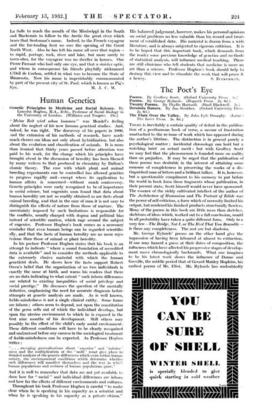Human Genetics
Genetic Principles in Medicine and Social Science. By Lancelot Hogben, M.A., D.Sc., Professor of Social Biology in the University of London. (Williams and Norgate. 15s.) " Meine Zeit wird sehon kommen" was Menders feeling about the neglect of his now famous genetical studies. And,. indeed, he was right. The discovery of his papers in 1900, and the extension of his methods of research, have made much clearer our ideas not only about hybridization, but also about the evolution and classification of animals. It is more than ironical that thirty years passed before attention was paid to. his work, for the change which his principles have brought about in the discussion of heredity has been likened by many writers to that produced in chemistry' by Dalton's atomic theory. The case With which plant and animal breeding experiments can be controlled has allowed genetics to progress rapidly and—exeept where its application to human affairs is concerned—without much controversy. Genetic principle's were early recognized to be of importance in social science, but eugenists soon found that data about human heredity are not so readily obtained as are facts about animal breeding, and that in the case of man it is not easy to distinguish the effects of nature from those of nurture. The uncertainty imposed by such limitations is responsible for the conflicts, usually charged with dogma and political bias instead of scientific caution, which rage around the subject of eugenics. Professor Hogben's book comes as a necessary remainder that even human beings can be regarded scientific- ally, and that the facts of human heredity arc no more mys- terious than those of animal or plant heredity.
In his preface Professor Hogben states that his book is an attempt to indicate " Where a sound foundation of accredited data is available" and to coasider the methods applicable to the extremely elusive material with which the human geneticist deals. He shows how the facts support Robert Owen's belief that the organization of no two individuals is exactly the same at birth, and Warns his readers that there are no data indicating to what extent " such inborn differences are related to existing inequalities of social privilege and- social prestige." He discusses the question of the mentally defeetiVe, emphasizing the need for accurate 'diagnosis before attempts at genetic analysis are made. As is well known, feeble-mindedness is not a single clinical entity. Some forms are inborn ;' others seem to depend, not upon the constitution of the germ cells out of which the individual develops, but upon the uterine environment to Which he is exposed in the first nine months of his development. Still -others easy possibly be the effect of the child's early social environment. These different conditions will have to be clearly recognized. and understood before any success in the sociological treatment of feeble-mindedness can be expected. As Professor Hogben writes :- " . . sweeping • generalisaticas about ' superior' and inferior ' races and the - multiplication of the unfit ' must give place to detailed analysis of the genetic differences which exist within human society, the environmental conditions which determine whet's, such differences will manifest themselves and the way in' bunion populations and sections of human populations grow."
And it is well to remember that data arc not yet available to show how far " racial " and individual differences are inborn and how far the effects of different environments and cultures.
Throughout his book Professor Hogben is careful." to make clear when -he. is speaking in his capacity as a scientist and when he is speaking in his capacity as a private citizen."
His balanced judgement, however, makes his personal opinions' on social problems no less valuable than his record and treat- 'Rent of established data. His material is drawn from a wide literature, and is always subjected to rigorous criticism. It is to be hoped that this important book, which demands from the reader some previous knowledge of genetics and methods of statistical analysis, will influence medical teaching.. There arc still clinicians who tell students that medicine is more an art than a science. Professor Hogben's hook should help to destroy this view and to stimulate the work that will prove it






































 Previous page
Previous page